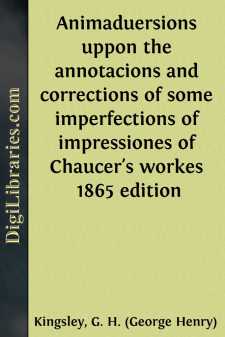Categories
- Antiques & Collectibles 13
- Architecture 36
- Art 48
- Bibles 22
- Biography & Autobiography 813
- Body, Mind & Spirit 142
- Business & Economics 28
- Children's Books 17
- Children's Fiction 14
- Computers 4
- Cooking 94
- Crafts & Hobbies 4
- Drama 346
- Education 46
- Family & Relationships 57
- Fiction 11829
- Games 19
- Gardening 17
- Health & Fitness 34
- History 1377
- House & Home 1
- Humor 147
- Juvenile Fiction 1873
- Juvenile Nonfiction 202
- Language Arts & Disciplines 88
- Law 16
- Literary Collections 686
- Literary Criticism 179
- Mathematics 13
- Medical 41
- Music 40
- Nature 179
- Non-Classifiable 1768
- Performing Arts 7
- Periodicals 1453
- Philosophy 64
- Photography 2
- Poetry 896
- Political Science 203
- Psychology 42
- Reference 154
- Religion 513
- Science 126
- Self-Help 84
- Social Science 81
- Sports & Recreation 34
- Study Aids 3
- Technology & Engineering 59
- Transportation 23
- Travel 463
- True Crime 29
Animaduersions uppon the annotacions and corrections of some imperfections of impressiones of Chaucer's workes 1865 edition
Categories:
Description:
Excerpt
PREFACE.
Although only the grandson of the first of his name, the author of the following interesting specimen of 16th-century criticism came of a family of great antiquity, of so great an antiquity, indeed, as to preclude our tracing it back to its origin. This family was originally known as the “De Botfelds,” but in the 15th century one branch adopted the more humble name of “Thynne,” or “of the Inne.” Why the latter name was first assumed has never been satisfacÃtorily explained. It can hardly be supposed that “John de la Inne de Botfelde,” as he signed himself, kept a veritable hostelry and sold ale and provender to the travellers between Ludlow and Shrewsbury, and most probably the term Inn was used in the sense which has given us “Lincoln’s Inn,” “Gray’s Inn,” or “Furnivall’s Inn,” merely meaning a place of residence of the higher class, though in this case inverted, the Inn giving its name to its owner.
However obtained, the name has been borne by the most successful branch of the De Botfelds down to the present Marquess of Bath, who now represents it. Much interesting matter connected with the family was collected by a late descendant of the older branch, Beriah Botfeld, and published by him in his “Stemmata Botvilliana.”
The first “John of the Inn” married one Jane Bowdler, by whom he had a son Ralph, who married Anne Hygons, and their son William became clerk of the kitchen, and according to some, master of the household to Henry VIII. He married in the first place a lady who, however she may have advanced her husband’s prospects at court, behaved in a manner which must have considerably marred his satisfaction at her success. Those who wish to study the matrimonial sorrows of “Thynnus Aulicus,” as he calls him, may consult Erasmus in his Epistolæ, lib. xv. Epist. xiv.
His second marriage to Anne Bond, daughter of William Bond, clerk of green cloth and master of the household to Henry VIII., was more fortunate, and by her he had daughters and one son, our Francis Thynne.
Though his son gives him no higher position in the court of Henry VIII. than the apparently humble one of clerk of the kitchen, he is careful to let us know that the post was in reality no mean one, and that “there were those of good worship both at court and country” who had at one time been well pleased to be his father’s clerks. That he was a man of superior mind there is no question, and we have a pleasant hint in the following tract of his intimacy with his king, and of their mutual fondness for literature. To William Thynne, indeed, all who read the English language are deeply indebted, for to his industry and love for his author we owe much of what we now possess of Chaucer. Another curious bit of literary gossip to be gleaned from this tract is that William Thynne was a patron and supporter of John Skelton, who was an inmate of his house at Erith, whilst composing that most masterly bit of bitter truth, his “Colin Clout,” a satire perhaps unsurpassed in our language....


